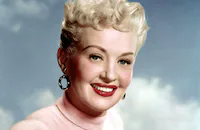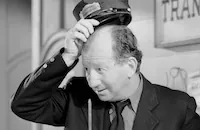When My Baby Smiles at Me
Cast & Crew
Walter Lang
Betty Grable
Dan Dailey
Jack Oakie
June Havoc
Richard Arlen
Film Details
Technical Specs

Synopsis
In a Kansas City burlesque house, in the 1920s, headliner Skid Johnson, an alcoholic comedian who has now not shown up on time for the third time in a week, barely makes it to the theater in time to go on. As he gets into his costume, his wife and partner, Bonny Kane, who smells liquor on his breath, complains about his lack of ambition, and he admits that he is just a "hoke" comic. While Skid is onstage, Bonny, who is not really mad at him, then threatens singer Sylvia Marco, who is leaving to be in a New York show, if she ever attempts to seduce Skid again. Later, Skid receives a telegram that offers him $500 a week to appear in the new show that big-time producer Sam Harris is putting on in New York, but following an argument with Bonny about Sylvia, Skid says he is not going. Cattleman Harvey Howell from Nevada, a fan who has followed Bonny's career in the trade papers, comes to her dressing room, and although flattered by the handsome cattleman's attention, Bonny quickly tells him she is married, which greatly disappoints Harvey. When Skid finds the two of them together, his nonchalance piques Bonny. With the help of Lefty Moore, the troupe's manager, Bonny convinces Skid to accept Harris' offer and promises to join him after the touring season is over. Skid is a hit, and on opening night, he convinces Harris to allow him to perform a new bit in the show. He is about to suggest Bonny as his partner, but Harris wants Sylvia for the part. After reading gossip about Skid and Sylvia, Bonny convinces Lefty to allow her to go to New York for a couple of days. She and Skid joyously greet each other, but Bonny becomes disheartened when she finds liquor bottles hidden in his bed. When she asks about Sylvia, he admits he has been out with her a few times, but says it means nothing. Bonny tells Skid that with her it is "all or nothing," and he says he will tell Harris to fire Sylvia. After Bonny returns to the troupe, however, Skid loses his nerve and does not talk to Harris, but continues to go out with Sylvia, and when Bonny reads a story about them, she cries. Skid soon is visited by a process server informing him he is being sued for divorce and is shocked. Bonny, who only wanted to bring Skid to his senses, decides to go through with the divorce when she hears nothing from Skid. Harvey reads about the pending divorce in Variety and invites Bonny to stay at his ranch in Nevada with his mother so that she can get a Reno divorce. Sometime later, after the divorce is granted, Gussie Evans, Bonny's former cohort, visits her at the Waldorf-Astoria in New York, as she plans to marry Harvey in Connecticut the following week. Gussie's husband Bozo and Lefty then enter with Skid, who acts as if he is happy for Bonny. However, as he begins to drink and perform a routine with Bonny from the past, they become teary-eyed. When Harvey arrives, Skid, now viciously drunk and uncontrollable, performs a mock wedding ceremony and gives the bride away, then breaks down crying in frustration and pain until Bonny yells for him to stop. Later, when Lefty learns that Skid is in Bellevue Hospital, he offers Skid a role in a new show that is opening in three weeks. Bolstered by Lefty's confidence in him, Skid agrees, but he does not show up for rehearsal the day of the opening. Bonny, who has received a wire from Lefty, arrives and offers to help. Skid then shows up drunk and wobbly, and they attempt to get him sober. After Bonny does a number, Skid protests that he cannot go on, and Lefty asks Bonnie to perform alone. Instead, Bonny leads Skid to the stage to do the number that had so affected them both in the past. When she tells him that she could not marry anyone she did not love and that she is now back with him, Skid revives completely and finishes the number. Backstage, Skid and Bonny cry and kiss.

Director

Walter Lang
Cast

Betty Grable

Dan Dailey

Jack Oakie

June Havoc

Richard Arlen

James Gleason
Vanita Wade
Kenny Williams

Jean Wallace
Pati Behrs
Robert Emmett Keane
Jerry Maren
George "beetlepuss" Lewis
Tom Stevenson
Sam Bernard
Mauritz Hugo
Frank Scannell
Tim Graham
Dave Morris

J. Farrell Macdonald
Les Clark
Harry Seymour
Lee Macgregor
Charles Tannen
Robert Karnes
George Melford
Robert Patten
Ted Jordan
Harry Carter
Tiny Timbrell

Tito Vuolo
Everett Smith
Bea Stephens

Bill Walker
Jasper Weldon
Chester Jones
George O'hara
William Vedder
Helen Foster
Charles La Torre
Donna Hamilton
Edward Clark
Lu Anne Jones
Dorothy Babb
Joann Dale

Noel Neill
Wanda Flippen
Angela Wilson

Ruth Hall
Joan Myles
Gloria Gable

Marion Marshall
Kit Guard
Jack Santoro
Roger Laswell
Bob Mccord
Carol West
Wanda Smith
Ruth Landis
Harriet Scott
Betty Jane Barton
Madge Journeay
Grace Davies

Hank Mann
Lela Bliss
Bert Hicks
John Shay
Nancy Hale
Lenore Nelems
Florence Pepper
Panchita Rowe
Louise Allen
Maxine Ardell
Kathleen Kelly
Dona La Barr
Billie Lane
Gwynne Norys
Edna Ryan
Jean Spangler
Sue Taylor
Crew
Jerry Adler
Michael Audley
Ben Bernie
Marie Brasselle
Monte C. Brice
Lew Brown
Alfred Bryan
Kenneth Casey
Con Conrad
Hugh Cummings
Buddy Desylva
Mort Dixon
Walter Donaldson
Leonard Doss
Raymond B. Egan
Sam Ehrlich
Seymour Felix
Fred Fisher
Bernard Freericks
Leland Fuller
Mack Gordon
Earle Hagen
Roger Heman
Charles Henderson
Ray Henderson
Renè Hubert
Harry Jackson
George Jessel
George Jessel
Gus Kahn
Natalie Kalmus
Henry Klinger
R. A. Klune
Ernest Lansing
Ernesto Lecuona
Charles Lemaire
George "beetlepuss" Lewis
Sam M. Lewis
Ted Lewis
Thomas Little
Francia Luban
Joe Mccarthy
Joseph Mccarthy
Barbara Mclean
Cyril J. Mockridge
James V. Monaco
Bill Munro
Josef Myrow
Alfred Newman
Ben Nye
Maurice De Packh
Maceo Pinkard
Elizabeth Reinhardt
Billy Rose
Gene Rose
Irving Rosenberg
Harry Ruby
John N. Scott
Fred Sersen
Herbert Spencer
Andrew B. Sterling
Al Stillman
Lamar Trotti
Anthony Ugrin
Richard Wagner
Lyle Wheeler
Richard A. Whiting
Kenny Williams
Joseph C. Wright
Saul Wurtzel
Joe Young

Film Details
Technical Specs

Award Nominations
Best Actor
Best Score
Quotes
Trivia
Notes
The working title of this film was Burlesque. The play Burlesque, originally produced on Broadway starring Barbara Stanwyck and Hal Skelly, won a Critics' Award as one of the ten best Broadway plays of 1927-28. According to news items and information in the Twentieth Century-Fox Records of the Legal Department at the UCLA Arts-Special Collections Library, after Paramount had produced films in 1929 and 1937 based on the play, they sold the rights to RKO, which planned a version to star Ray Bolger. In 1944, Columbia bought the motion picture rights to the play from Paramount, and according to a March 23, 1944 New York Times item, Al Jolson, in his first assignment as a producer for Columbia, was planning to supervise a film based on the play, starring Rita Hayworth. That production was never realized.
In September 1947, Los Angeles Times reported that Joan Crawford wanted to star in a film based on Burlesque, but Columbia refused to sell the rights to Warner Bros., Crawford's studio. Columbia then sold the motion picture rights to Twentieth Century-Fox in exchange for racehorse stock shots from their 1938 film Kentucky (see AFI Catalog of Feature Films: 1931-40; F3.2260) for use in The Return of October. At the time of the purchase by Twentieth Century-Fox, the play was being produced in a revival on Broadway starring Bert Lahr and Jean Parker.
According to publicity for the film at the AMPAS Library, producer George Jessel envisioned producing this film with Dan Dailey and Betty Grable after seeing them in Twentieth Century-Fox's 1947 musical about a vaudeville family, Mother Wore Tights.
According to information in the Produced Scripts Collection and in Records of the Legal Department, the film originally was to begin with George Jessel "orating regarding burlesque in the middle twenties. He says, 'It was the West Point for many great artists-Weber and Fields, Sam Bernard, David Warfield in the old days; and stars who are still going strong today-Eddie Cantor, Fannie Brice, Bert Lahr, Leon Errol, Sophie Tucker, and if you'll pardon the expression, even me, Georgie Jessel.'" In the final film, an offscreen narrator situates the film in 1920s burlesque, but does not name any specific performers.
The film contains a scene in which Dailey, as the character "Skid Johnson," does an imitation of vaudevillian Ted Lewis singing the title song, "When My Baby Smiles at Me." Lewis is mentioned by name in the scene. According to the Legal Records, Lewis, after signing an agreement allowing the company to impersonate him and to use his name, complained in writing that he had understood that the impersonation would be the same as the one that Hal Skelly originated in the play Burlesque and that Bert Lahr used when he later appeared in the play. That impersonation appeared in the song "Just Around the Corner." Lewis, who stated that the song "When My Baby Smiles at Me," which he co-wrote, had been his theme song for almost thirty years, was upset that the studio had appropriated the title for their film without consulting with him. In a letter dated August 10, 1948, after filming had been completed, Lewis wrote that he had been informed that Dailey had impersonated him throughout the film, not just for one song, and stated, "I hereby withdraw the limited consent to have Dan Dailey impersonate me...for I am convinced that if you do so you will cause me very considerable damage." In a subsequent memo, a studio official stated that Lewis was in error "as we do not impersonate him throughout the picture." Lewis later was informed that the studio had procured permission from the publisher of the song to use the title.
Dailey received an Academy Award nomination for Best Actor, but lost to Laurence Olivier in Hamlet. Betty Grable and Dailey reprised their roles on the Lux Radio Theatre on April 25, 1949. A radio adaptation was also broadcast on Screen Directors' Playhouse on May 5, 1950. On March 17, 1955, a television version, "Burlesque," was broadcast on CBS-TV's Shower of Stars, with Dailey, Jackie Oakie, Marilyn Maxwell and Joan Blondell. As noted above, the play Burlesque was first filmed by Paramount in 1929 as Dance of Life, directed by John Cromwell and Edward Sutherland and starring Hal Skelly and Nancy Carroll (see AFI Catalog of Feature Films, 1921-30; F2.1141), and in 1937 as Swing High, Swing Low, directed by Mitchell Leisen and starring Carole Lombard and Fred MacMurray (see AFI Catalog of Feature Films, 1931-40; F3.4437).












